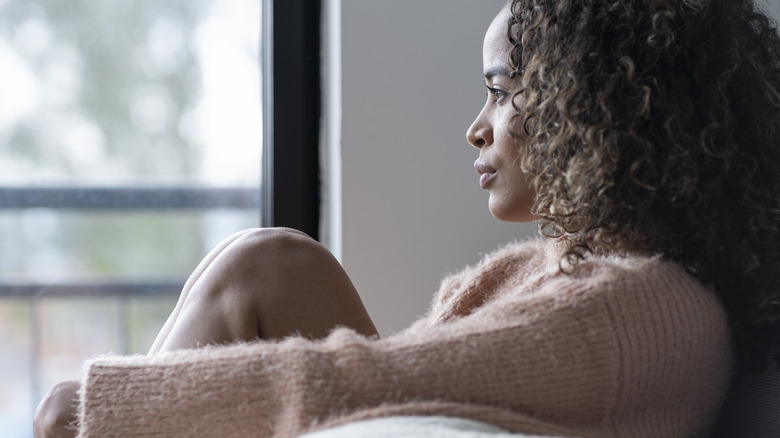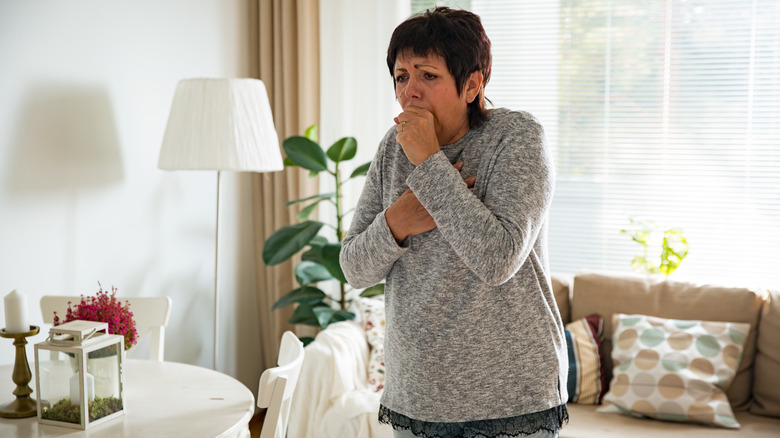When You Stay Inside All Day, This Is What Happens To Your Blood Pressure
There's nothing better than snuggling up under a cozy blanket with a good book and a hot cup of tea on a gray, stormy day. Nobody wants to venture outside during a torrential downpour, so you've happily relegated yourself to the sofa for the afternoon. But while we all need a couch potato day like this every once in a while, withdrawing from society and staying indoors all day, every day may have a negative effect on our blood pressure.
According to the U.S. Centers for Disease Control and Prevention (CDC), a normal blood pressure reading should come in under 120/80 millimeters of mercury (mmHg), or "120 over 80," as you may have heard your doctor put it. People with high blood pressure, or hypertension, have a blood pressure reading of 130/80 mmHg or higher. A number of factors can influence our blood pressure levels, including smoking, a lack of exercise, a diet high in sodium or alcohol, and more. Additionally, some research shows that loneliness related to social isolation may also raise the risk of developing high blood pressure (via AARP).
Social isolation is considered a risk factor for hypertension
"As a species, we're not meant to be without other people," associate professor at the University of British Columbia Annalijn Conklin told AARP. "If you are socially isolated, it raises your cortisol levels to put you in a fight-or-flight response." Although the body's fight-or-flight response may vary between men and women, experts at Macomb Medical Clinic explain that when our body is in this state, our blood pressure increases. While being in a state of fight-or-flight usually subsides after the perceived threat has passed, experiencing elevated levels of stress on an ongoing basis, even mildly, can lead to hypertension down the line.
In fact, 2018 research published in Antioxidants & Redox Signaling cites loneliness and social isolation as two cardiovascular disease risk factors. The researchers point out that people experiencing loneliness have been shown to have increased blood pressure levels and increased peripheral vascular resistance, or the circulatory resistance our body uses to generate blood pressure (via StatPearls). Even in the animal kingdom, social isolation has been linked with a greater risk of cardiovascular disease. In addition to increasing the risk of hypertension, social isolation has also been associated with a greater risk of mortality. Because we tend to become more susceptible to social isolation as we grow older, interpersonal connection is particularly important for older adults.
Indoor air pollution can also increase blood pressure
Aside from the potentially damaging effects of social isolation on our health, there's another reason why staying inside all day may be detrimental to our blood pressure: exposure to indoor air pollution. Sources of indoor air pollution can include anything from dust and pollen to particulate matter from automobile exhaust, smoking, cooking, and more. In a 2018 study published in the International Journal of Environmental Research and Public Health, researchers found that exposure to indoor air pollution increased systolic blood pressure measurements in Australian adults. The study team ultimately concluded that indoor air pollution is one environmental risk factor we can modify to help lower the chances of developing high blood pressure.
While social isolation and exposure to indoor air pollution are multifaceted issues, research suggests that getting outside for some fresh air and sunshine can have a positive effect on our blood pressure. According to UC Davis Health, spending time outdoors may help lower our heart rate, cortisol levels, and blood pressure, as well as reduce cardiovascular disease rates.



